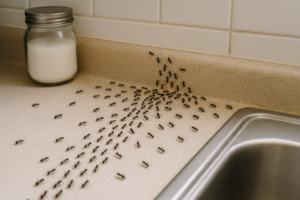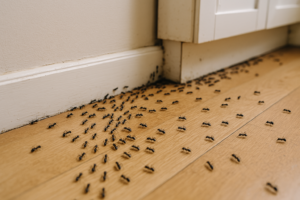

As a landlord, providing tenants with a pristine rental property is part of the job description. But when it comes to pest infestations on a rental property, who is responsible for extermination- the landlord or the tenants? The answer is not as straightforward as you may think, which can sometimes lead to disputes between property owners and tenants. Read on to learn who is responsible for pest control and when.
What Pests Invade Rental Properties?
The most common pests throughout the United States are ants, bed bugs, beetles, cockroaches, fleas, flies, termites, ticks, rodents, and silverfish.
Is The Tenant or The Landlord Responsible for Pest Control?
The responsibility of pest control in a rental property almost always falls upon the landlord. According to the legislation in most states, including New Jersey and Florida, landlords are required to provide renters with a clean, structurally safe, and pest-free rental space. That being said, most states also have a clause stating that if a landlord can prove that the renter is the cause of an infestation, the renter is responsible for covering the cost of extermination. In other words, the landlord is always responsible for pest control; however, if pests show up as a direct result of the renter’s living habits, the renter is responsible for extermination.
If a property has to be evacuated for a pest control treatment, such as fumigation, the landlord cannot collect rent during the evacuation period, however they are not responsible for the cost of the renter’s temporary lodgings.
When entering a rental agreement with a tenant, it is important to include a contractual clause regarding pest control. This will ideally prevent any legal disagreements, and if any disagreements should arise, they can be more easily resolved. In most cases, a landlord cannot legally evict a tenant solely because of a pest infestation. However, if the infestation is the tenant’s fault and they are in violation of the rental agreement, you may charge them for extermination and issue them a “notice to comply or quit.” This essentially states that they are the cause of the infestation and they are responsible for both the extermination as well as fixing the conditions that led to the infestation. If they do not comply, they will be evicted. Typically, a landlord needs to prove in a court of law that the renter is at fault in order to issue a “notice to comply or quit.”
How To Handle Infestations on Your Rental Properties
No matter who caused the infestation, eradication needs to be the first priority. When you are notified of an infestation on your property, you should contact your pest control company immediately or within 1 to 2 days. You should record all steps involved in the pest removal procedure. That way the tenant can always be fully aware of the process, and if the tenant is found to be at fault, you can provide them with all of the information needed to charge them for the extermination.
Can You Exterminate Rental Property Pests Yourself?
Many landlords think that doing their own pest control (i.e. mouse traps and wasp spray) is a more cost effective way to prevent pests. While this may sometimes be true, it is not actually legal. According to the EPA, someone may only apply pesticides to their own dwelling unless they are a certified commercial pesticide applicator. This means that it is illegal to personally attempt to exterminate pests on a property where you do not live, regardless of whether or not you own the property. Because of this, the most cost efficient pest control technique is employing strict pest prevention methods. Ideally, prevention should be combined with routine visits from a professional pest control company.
How Quickly Do You Need To Act Upon Infestations?
Pests of all kinds should be exterminated as promptly as possible. If the landlord does not initiate pest removal measures within a day or two of learning of an infestation, renters can legally take actions like withholding rent or breaking the lease.
In certain situations, there may be a legal dispute regarding who is responsible for the cost of an extermination. Even in these cases, it is vital to eliminate the pests before anything else. The best course of action for landlords is to hire and pay for a professional exterminator up front, and pursue any necessary legal action after the pests are eliminated or during the period of extermination.
How to Prevent Pests on Rental Properties

Educate Tenants on Pest Prevention
When entering a lease agreement with a tenant, take a moment to talk to them about their responsibilities regarding pest prevention. Explain which habits can help prevent infestations, such as proper food storage, taking out the garbage often, proper garbage storage, cleaning the property regularly, and removing sources of standing water around the yard. This is also a great time to discuss situations in which the renters would be responsible for pest removal costs.
Employ Pest Prevention Methods
Keep up with property maintenance such as
- Sealing cracks in the walls or foundation
- Repairing or replacing broken shingles
- Providing outdoor garbage receptacles that have tight-fitting lids
- Promptly repairing all leaks and clogs
- Providing adequate dehumidification in damp areas (i.e. basements and crawl spaces)
- Keeping grass and vegetation trimmed
- Removing debris and leaf piles
- Removing sources of standing water
- Aerating decorative pools or stocking them with fish
- Keeping wood piles at least 20 feet from the outside of the building
Ensure Regular Pest Control Treatments
Hire a pest control company to provide regularly scheduled preventative pest control treatments. Ask tenants to report any signs of pest activity right away so you can schedule extra visits from the pest control company whenever necessary.
Visit Your Properties Regularly
Regularly visiting your properties allows you to check for any property maintenance issues and signs of pest activity. It also allows you to make sure tenants are still applying the appropriate pest prevention techniques.
If you’re looking for a pest control company to protect your rental properties, Excel has your back. We will work with you and your renters to build a customized pest control plan that works for everyone. Call Excel, and exhale.






